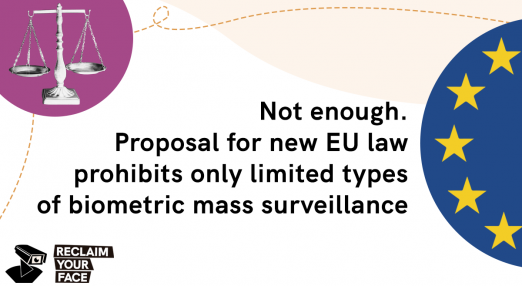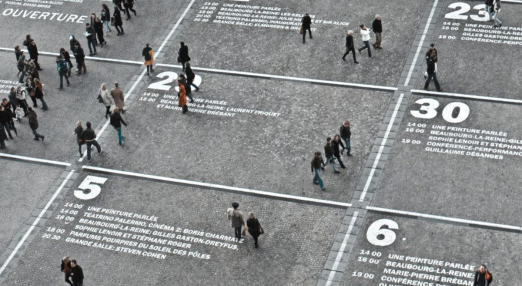Our work
EDRi is the biggest European network defending rights and freedoms online. We work to to challenge private and state actors who abuse their power to control or manipulate the public. We do so by advocating for robust and enforced laws, informing and mobilising people, promoting a healthy and accountable technology market, and building a movement of organisations and individuals committed to digital rights and freedoms in a connected world.
Filter resources
-

European Parliament confirms new online censorship powers
EU regulation against ‘terrorist’ content online (TERREG) was approved without a final vote by the European Parliament on April 29th. The regulation will harm our ability to freely express ourselves and access information online.
Read more
-

EU’s AI law needs major changes to prevent discrimination and mass surveillance
The European Commission has just launched the its proposed regulation on artificial intelligence (AI). As governments and companies continue to use AI in ways that lead to discrimination and surveillance, the proposed law must go much further to protect people and their rights. Here’s a deeper analysis from the EDRi network, including some initial recommendations for change.
Read more
-

New AI law proposal calls out harms of biometric mass surveillance, but does not resolve them
On 21 April 2021, the European Commission put forward a proposal for a new law on artificial intelligence. With it, the Commission acknowledged some of the numerous threats biometric mass surveillance poses for our freedoms and dignity. However, despite its seemingly good intentions, the proposed law falls seriously short on our demands and does not in fact impose a ban on most cases of biometric mass surveillance – as urged by EDRi and the Reclaim Your Face coalition.
Read more
-

Luca contact tracing app: CCC calls for an immediate moratorium
A dubious business model, defective software, irregularities in the awarding of contracts: EDRi member, Chaos Computer Club (CCC) demands an immediate end to federal funding for the “Luca” contact tracing app.
Read more
-

How Austria wants to implement upload filters and ancillary copyright
EDRi's member epicenter.works sheds light on the Austrian implementation of the controversial Copyright Directive passed in the EU Parliament in 2019. As positive as some draft provisions regarding upload filters are, the Austrian implementation of ancillary copyright is poor.
Read more
-

Dominant tech companies make their products incompatible deliberately
Imagine buying a new dining table from IKEA and although it’s a great table, it can only be used with IKEA-made chairs. For security reasons, the furniture maker tells you, the table is incompatible with chairs from third party vendors, sorry. Sounds ridiculous? Welcome to today’s online platform economy.
Read more
-

Anonymity is indispensable
Would an anonymity ban on social media be a good solution to counter all the hatred on these platforms? We were asked this question by a national newspaper in response to such calls. Here is the reaction. of EDRi's member Bits of Freedom.
Read more
-

Why EU needs to be wary that AI will increase racial profiling
Central to predictive policing systems is the notion that risk and crime can be objectively and accurately forecasted. Not only is this presumption flawed, it demonstrates a growing commitment to the idea that data can and should be used to quantify, track and predict human behaviour. The increased use of such systems is part of a growing ideology that social issues can be solved by allocating more power, resources - and now technologies - to police.
Read more
-

E-Evidence: trilogues kick off on safeguards vs. efficiency
The Regulation on European production and preservation orders for electronic evidence in criminal matters (E-Evidence) aims to create clear rules on how a judicial authority in one Member State can request electronic evidence from a service provider in another Member State. One such use case would be requesting user data from a platform in another EU country during an investigation. We wrote about our main issues in the past.
Read more
-

Upcoming judgment against mass surveillance in France
On Wednesday 21 April, the Conseil d'Etat (France's highest administrative court) will issue its final decision in the most important case that EDRi's observer La Quadrature du Net (LQDN) has ever brought against the intelligence services. This will be the end of six years of proceedings, dozens of briefs and countless twists and turns that have made LQDN what it is today.
Read more
-

Thousands Expected to Sue Facebook in Mass Action Against Privacy Breach
EDRi's member Digital Rights Ireland (DRI) will sue Facebook to recover damages for those affected by the recent breach of personal data by Facebook, a first for legal actions against tech companies in Europe. See how you can join the lawsuit if you were affected.
Read more
-

EDRi-gram, 22 April 2021
Issues of non-discrimination and fundamental rights would have to be at the core of the approach to artificial intelligence, rather than considered after competition and industrial policy. A truly people-centred AI regulation would take a step back and acknowledge the inherent harms AI will perpetuate if deployed for certain purposes.
Read more
